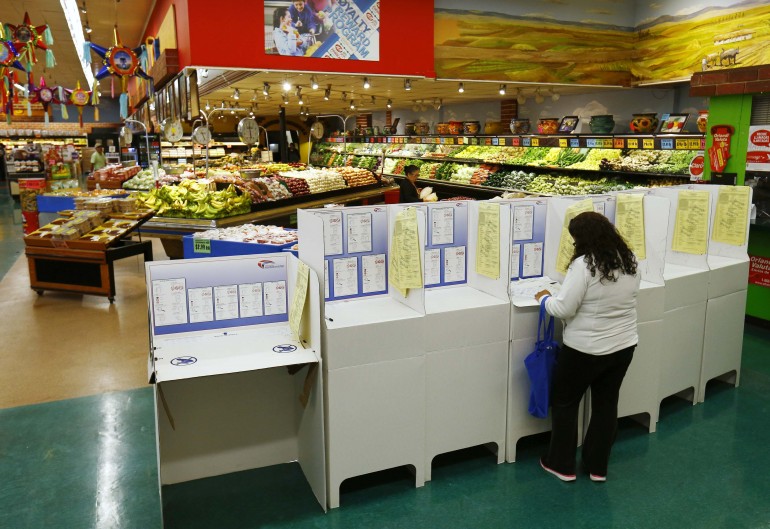
A woman votes from a polling station located inside a local grocery store during U.S. midterm elections in National City, California (REUTERS)
By Jasmine Kabatay
The U.S. Senate could be under new management by early Wednesday.
All seats in the House of Representatives are available, along with one-third of the Senate. And if the Republicans do gain control of the upper house, it could change the way America does business with the world. They were just six seats short of a majority.
“There’s a lot on the line, not only for America but also for other countries,” said Sharon Manitta, press communications director for Democrats Abroad.
Why should Canadians care?
U.S. elections impact U.S. policy, and in turn, certain policies may impact Canada, said Michael Loughran, a political science specialist at the University of Toronto who has worked as a Deputy Field Officer for the 2012 Obama campaign.
“We (Canada) are their largest trade partner,” said Loughran. “Our economies share a level of dependence, and we are allies in NATO. Whether we like to believe it or not, the political atmosphere in America does have an impact on Canada, and consequently Canadians.”
But it doesn’t stop there. Certain issues have a global effect.
“If the Republicans win the senate, they have the power to select the chairmen of the various committees and that’s going to affect a lot of things,” said Manitta. “The environment, as you know it doesn’t stay in one country. Climate change is a reality.“
As globalization continues to occur, our nations are becoming increasingly interconnected, said Loughran.
“The world is increasingly made up of global citizens, so Canadians don’t necessarily have to care about U.S. politicians or elections, but they should care about the possible outcomes they may represent,” said Loughran.
Expecting gridlock
Republicans currently hold most of the power, and if the status quo is upheld, a gridlock will continue, extending what House Minority Whip Steny Hoyer described as “the least productive Congress in which I have served.”
“We have a gridlock because people don’t want to work together,” said Manitta. “It’s not only affecting the country in very specific, concrete ways, it’s also affecting the way people look at government.”
If the Democrats win the House, Obama would have increased power, said Loughran. “So the outcome really does matter greatly, despite extremely low historical voter turnouts.”
U.S. views on key issues
Eligible voters will also be able to vote on proposed legislation through ballot measures.
Issues range from the legalization of marijuana, to gun control, to same sex marriage.
“(Ballot measures) are good indicators of how U.S. civil society views key issues, and often times support at the state level will increase as the likelihood of action at the federal level in years to come,” said Loughran.
Today concludes a bizzare election to say the least.
“It’s the strangest election I’ve worked on and I’ve worked on an awful lot of them,” said Minattra.

